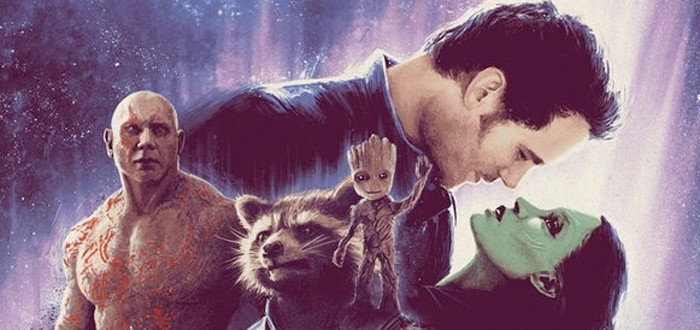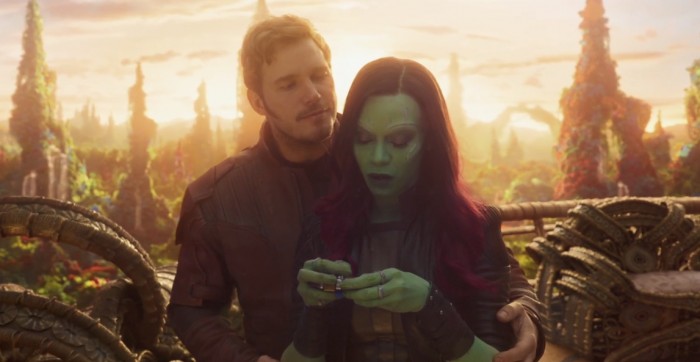Why 'Guardians Of The Galaxy' Is The Best Corner Of The Marvel Cinematic Universe
Since 2008, Marvel Studios' impact has become impossible to ignore and tempting to replicate. Though Marvel films were successful before the release of Iron Man – the X-Men series comes to mind – the introduction of characters like Tony Stark, Thor, and Captain America has inspired their competitors to copy the house style and build expanded cinematic universes of their own. That's why Marvel's choice to make Guardians of the Galaxy in 2014 was so striking, a welcome breath of fresh air after 6 years of movies that felt like pieces in a massive, interconnected, never-ending puzzle.
Guardians of the Galaxy requires little to no knowledge of the MCU at large; while Thanos and his lusted-after Infinity Stones are part of the story, someone could watch the film without knowing why that character and those stones matter outside of the film. In a lot of ways, Guardians of the Galaxy, Vol. 2 is more surprising, because it continues the stand-alone, self-contained storytelling established in its predecessor. All the first film's characters, from Star-Lord to Baby Groot, have returned and remain outside of the world of the Avengers, S.H.I.E.L.D., and the like.
Separated and It Feels So Good
Over 15 films, the two Guardians of the Galaxy films are the best Marvel has released, precisely because of their stand-alone nature. Marvel movies are largely well-made, with gradually advancing storylines and characters; they are, in a way, often decent without always being remarkable. Some of the characters are no doubt memorable or funny or winning, and some action sequences stand out, such as the airport fight scene in Captain America: Civil War. But by operating outside of Marvel's style, Guardians of the Galaxy and its sequel stand tallest. By not feeling like necessary pieces in the MCU puzzle, these movies are quite simply better.
Even with touches of the traditional Marvel film (you get three guesses as to whether Stan Lee has a cameo, and the first two don't count), GOTG Vol. 2 almost doesn't exist within the MCU. Because Peter Quill was abducted from Earth in the 1980s, and wasn't connected to a young Tony Stark or Bruce Banner or Scott Pym, he has no awareness of the Avengers or the general onslaught of superheroes in his old home. That blithe ignorance was pleasing in the first film, but is downright shocking in the second, if only for extratextual reasons: Chris Pratt, Zoe Saldana, Dave Bautista, and the rest of the cast are in next summer's Avengers: Infinity War. With only a year between Guardians of the Galaxy, Vol. 2 and that film, it wouldn't be wrong to assume this movie might operate as a build-up for what will surely be a massively overstuffed spectacle. Hell, there are five post-credits scenes in GOTG Vol. 2, which suggests at least one such tease.
The Empire Effect
And yet. Mercifully, magically, that's not the case. Guardians of the Galaxy, Vol. 2 uses a recognizable template for its story, but one firmly removed from comic books: that of The Empire Strikes Back, though in ways that aren't as dark as the way in which the 1980 film wraps up. Our quintet of heroes, after an initial battle with their previous employers, separate.
Star-Lord, Gamora, and Drax go with a mysterious man named Ego (Kurt Russell) who is a. Star-Lord's long-lost father and b. kind of an immortal planet. (It makes sense.) Rocket, Groot, and Gamora's furious sister Nebula — acquired as payment for the job that opens the film — stay back to fix their ship before the Ravagers, led by Yondu, return to cause trouble. Each hero spends the second act in their own little story, only to reunite for the climax; GOTG Vol. 2 isn't the first sequel to follow in Empire's footsteps, but it's one of a few to learn the correct lessons, enriching the characters in the process.
Character and Family
What's more, GOTG Vol. 2, like its predecessor, doesn't feel like most comic-book movies (and most Marvel movies) in that the universe never seems like it hangs in the balance. Technically, after we learn about Ego's nefarious plans for the galaxy in achieving his "purpose", the universe does hang in the balance, but in a way that's specific to our characters. While writer/director James Gunn cuts away to various planets, including Earth, affected by Ego's master plan, it's more the Guardians whose fates hang in the balance over anything else.
No matter how big the action gets in this film – and this is Marvel, so it does – it connects specifically to the characters. In even the better serialized Marvel movies, characters end up feeling like pawns in a larger game to get them to a specific place to set up for the next Marvel movie. In Guardians of the Galaxy, Vol. 2 and its predecessor, the characters are treated as characters; the theme of this movie specifically, kind of like another recent blockbuster co-starring Vin Diesel, is "family," but this time, it's extremely earned. Gunn's affection for the characters manifests in this way, in a satisfying series of character journeys that comprise the whole.
The Guardians of the Galaxy films are a kind of double-edged sword for Marvel: the first one is rightly adored by many fans, and the second one is likely to please the same large swath of audiences. (That it is better than, not just equal to, the original is something of a miracle.) They succeed largely because the adventures of Star-Lord, Gamora, Drax, Rocket, and Groot have yet to truly intertwine with the rest of the Marvel Cinematic Universe. They have so far existed outside of the MCU, standing taller than the rest precisely because of that fact. These two movies, at least, feel special because they operate on a different wavelength than the rest of the MCU; it's hard not to be a little concerned, then, about what happens next year and beyond, when the Guardians meet the Avengers. Conceptually, it might sound fun; in reality, it might mean these heroes get a bit diluted in the process.


